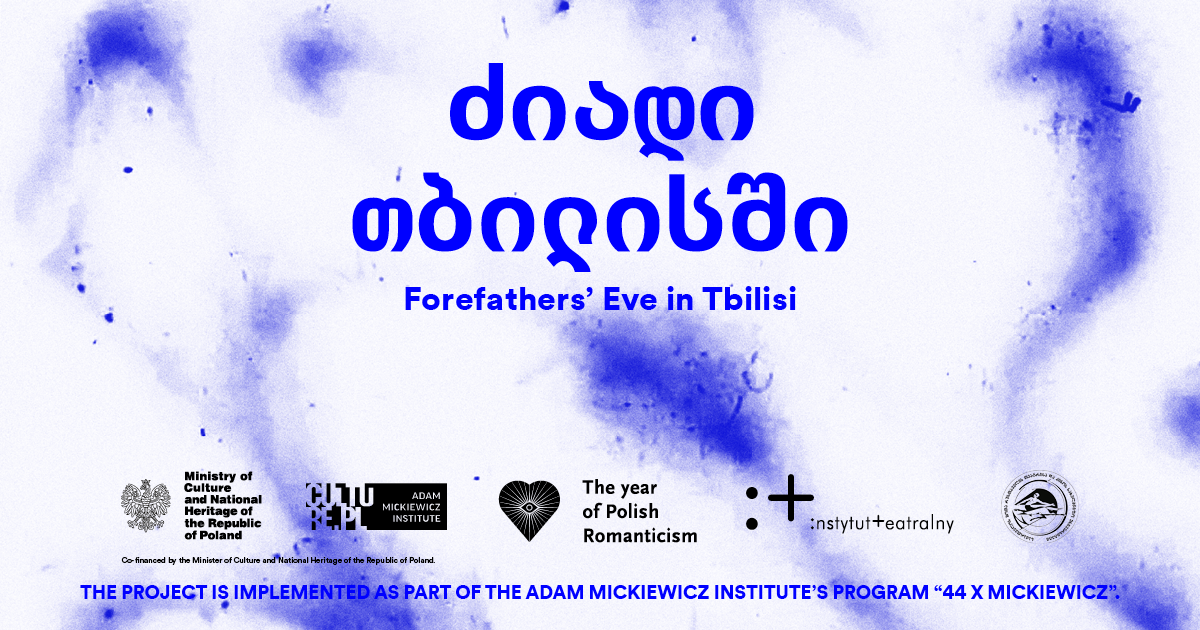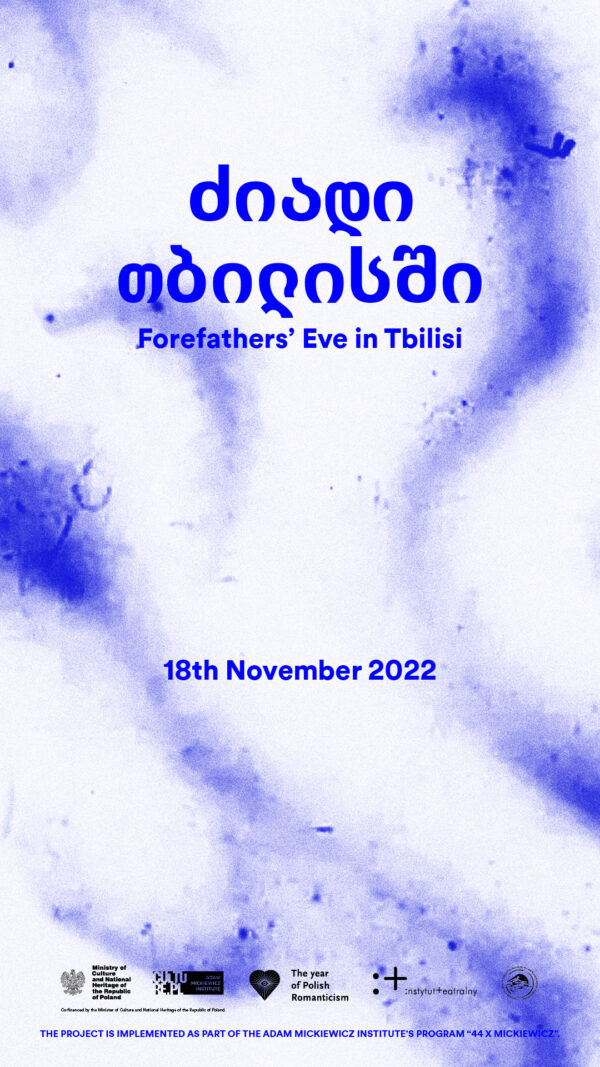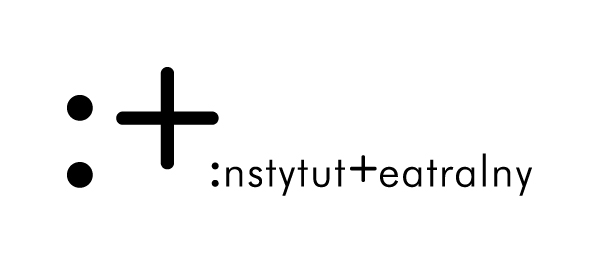[PL]
W dniach 5-7 października w Tbilisi odbędą się warsztaty dramaturgiczne i wykład o polskim romantyzmie, które będą wprowadzeniem do listopadowego czytania performatywnego II części „Dziadów” Adama Mickiewicza. Oba wydarzenia organizowane są przez Instytut Teatralny im. Zbigniewa Raszewskiego i Uniwersytet Teatru i Filmu im. Szota Rustaveli w ramach programu Instytutu Adama Mickiewicza „44 x Mickiewicz”.
„Dziady w Tbilisi” są częścią szeroko zakrojonego projektu, zakładającego popularyzację polskiej literatury romantycznej za granicą. To pierwszy raz, gdy dzieło Mickiewicza w całości zostanie przetłumaczone na język gruziński. Gruzińska tłumaczka polskiej literatury – Keti Kantaria – we współpracy z poetką Aną Kopaliani od podstaw stworzą tekst, nad którym będą pracować artyści teatru w Gruzji.
Kiedy przed rokiem wznosiłem toasty wspólnie z Giorgi Shalutashvili, rektorem Uniwersytetu Teatru i Filmu im. Shota Rustaveli w Tbilisi, dotarło do nas obu, że nie znamy się… tak od serca. Nasza dyskusja zaowocowała wówczas projektem artystycznym, tyleż śmiałym, co aż proszącym się o realizację – wystawieniem „Dziadów” Adama Mickiewicza po gruzińsku.
Polski arcydramat należy jednak najpierw przełożyć na język naszych kaukaskich braci, potem ten przekład opublikować, a wreszcie – wyreżyserować widowisko. Ta fascynująca przygoda właśnie się zaczęła. Tłumaczenia Mickiewiczowego poematu podjęła się Keti Kantaria, autorka przekładów min. Schulza, Gombrowicza i Witkacego, zaś uczynić z tego poezję odważyła się Ana Kopaliani, jedna z najbardziej cenionych współczesnych poetek gruzińskich. Spektakl wyreżyseruje Andro Enukidze, znany polskim widzom jeden z najlepszych gruzińskich reżyserów teatralnych, a przy tym znawca polskiego teatru.
– prof. Artur Grabowski, pomysłodawca projektu
W październiku – przed rozpoczęciem pracy scenicznej – badacze romantyzmu polskiego przeprowadzą warsztaty tematyczne dla artystów oraz studentów wydziału teatralnego Uniwersytetu im. Szota Rustaveli w Tbilisi. Pomoże im to lepiej zrozumieć twórczość Mickiewicza oraz konteksty, które ukryte są poza warstwą tekstową (polska religijność ludowa, liturgia katolicka i dramat misteryjny, obrzędowość słowiańska, mitologia i baśń Europy Wschodniej, ikonografia z okresu polskiego romantyzmu). Poznają także wątki biograficzne dotyczące samego autora, istotne dla całego dramatu. Warsztaty oraz praca nad tekstem będzie udokumentowana, a nagrania wideo zostaną opublikowane po zakończeniu projektu. Warsztaty poprowadzi prof. Artur Grabowski oraz prof. Marek Troszyński.
Obrzędy i zwyczaje takie jak „Dziady” są częścią tożsamości narodowej różnych narodów.
Rzeczywiście, nie sposób pomyśleć, że może istnieć wspólnota, która ani razu, zwłaszcza w czasie zawirowań historycznych czy egzystencjalnych, nie miałaby ochoty zapytać swoich przodków, skąd bierze się jej jedność i jakie błędy przodkowie popełnili, skoro teraźniejszość jest, delikatnie mówiąc, taka nieciekawa.
Gruzja nie jest wyjątkiem. Na przykład w Swanetii nie raz pytano przodków o podobne rzeczy, a ich odpowiedzi nie zawsze przynosiły nadzieję. A były prawie takie same jak w nieśmiertelnym dziele Adama Mickiewicza.
– Andro Enukidze
Harmonogram
5-7.10 | wykład prof. Marka Troszyńskiego „Polski arcydramat romantyczny na tle dramatu europejskiego” oraz warsztaty dramaturgiczne prof. Artura Grabowskiego „Dramat romantyczny” | Uniwersytet Teatru i Filmu im. Szota Rustaveli w Tbilisi
18.11 | czytanie performatywne II części „Dziadów” Adama Mickiewicza
Projekt realizowany w ramach Programu Instytutu Adama Mickiewicza „44 x Mickiewicz”, którego celem jest przypomnienie wkładu polskiej kultury w kulturę europejską, reaktywacja romantycznych idei oraz nawiązanie do niepowtarzalnych elementów polskiego romantyzmu. Pozwala też spojrzeć na kulturę XIX wieku z perspektywy współczesności.
Projekt jest współorganizowany przez Instytut Teatralny im. Zbigniewa Raszewskiego, Instytut Adama Mickiewicza i Uniwersytet Teatru i Filmu im. Szota Rustaveli w Tbilisi.
Instytut Teatralny im. Zbigniewa Raszewskiego powołuje publiczną debatę o współczesnym polskim teatrze, poszerza perspektywy towarzyszącej mu refleksji naukowej, wspiera działalność badawczą i edukacyjną. Prowadzi największy portal poświęcony w całości polskiemu teatrowi (www.e-teatr.pl), internetową encyklopedię polskiego teatru (www.encyklopediateatru.pl), specjalistyczną Księgarnię PROSPERO (www.prospero.e-teatr.pl) oraz Wydawnictwo. W Instytucie znajduje się także największe w Polsce archiwum tematyczne gromadzące dokumentację współczesnego teatru. Do dyspozycji wszystkich zainteresowanych jest olbrzymi zbiór artykułów prasowych, recenzji, zdjęć, programów teatralnych, afiszy, plakatów, dokumentów związanych z działalnością poszczególnych scen. Wiele zdigitalizowanych dokumentów udostępnianych jest w części wirtualnej archiwum na stronach e-teatr.pl oraz encyklopediateatru.pl.
Uniwersytet im Szota Rustaveli kształci aktorów, reżyserów dramatu, filmu i telewizji, krytyków teatralnych i filmowych, historyków sztuki, choreografów i ekspertów sektora kulturalno – edukacyjnego. Posiada teatr im. D. Aleksidze, który licznie odwiedzany jest przez gruzińską widownię. Na wspomnianej wyżej scenie odbywać się będzie pokaz w ramach realizowanego wspólnie projektu „Dziady w Tbilisi” – czytania performatywnego II cz. “Dziadów”. Uniwersytet może pochwalić się także bibliotek oraz instytutem naukowym, który przygotowuje encyklopedie gruzińskiego teatru i kina.
Instytut Adama Mickiewicza jest narodową instytucją kultury, utworzoną w 2000 roku. Cel Instytutu – budowanie trwałego zainteresowania polską kulturą na świecie, realizowany jest we współpracy z partnerami zagranicznymi i poprzez międzynarodową wymianę kulturalną w dialogu z odbiorcami, w zgodzie z założeniami polskiej polityki zagranicznej. Do 2022 roku Instytut zrealizował projekty w ponad 70 krajach na 6 kontynentach. Organizatorem Instytutu Adama Mickiewicza jest Ministerstwo Kultury i Dziedzictwa Narodowego.
[ENG]
On 5-7 October, Tbilisi will host a drama workshop and a lecture on Polish Romanticism, which will be an introduction to the November performative reading of Adam Mickiewicz’s Part II of “Forefathers’ Eve.” Both events are organized by the Zbigniew Raszewski Theatre Institute and Shota Rustaveli Theatre and Film State University as part of the Adam Mickiewicz Institute’s programme entitled: “44 x Mickiewicz.”
“Forefathers’ Eve in Tbilisi” is a part of a large-scale project aiming to popularize Polish romantic literature abroad. It is the first time that Mickiewicz’s drama poem in its entirety will be translated into Georgian language. The Georgian translator of Polish literature, Keti Kantaria, will work together with the poet Ana Kopaliani to create a new text, which will provide the basis for the work of Georgian theatrical artists.
One year ago, as Giorgi Shalutashvili, the dean of the Shota Rustaveli Theatre and Film State University and I celebrated toasts together, it occurred to us that we don’t… really know each other. Following a discussion, we decided to work together on a bold artistic project that seemingly begged to be produced – a presentation of Adam Mickiewicz’s “Forefathers’ Eve” in Georgian language. At first, this supreme piece of Romantic drama had to be translated into the language of our Caucasian brothers, then published, and finally – we could go about directing the spectacle. This fascinating adventure has just begun. Keti Kantaria, the author of translations of Schulz, Gombrowicz and Witkacy, translated Mickiewicz’s poem and Ana Kopaliani, one of the most respected contemporary Georgian poets, dared to turn this into poetry. The performance will be directed by Andro Enukidze, one of the best Georgian theatre directors known to Polish audiences and an expert in Polish theatre.
— Prof. Artur Grabowski, the originator of the project
In October 2022 – before stage work begins – scholars of Polish Romanticism will conduct thematic workshops for artists and students of the Shota Rustaveli Theatre and Film State University in Tbilisi. This will help them to better understand Mickiewicz’s work and the contexts hidden beyond the textual layer, including: Polish folk religiosity, Catholic liturgy and mystery plays, Slavic rituals, Eastern European mythology and fairy tales, iconography from the period of Polish Romanticism. Participants will also learn biographical details about the author that influenced the creation of the poem. These workshops and work on the text will be documented and videos will be made available once the project is concluded. The workshop will be led by prof. Artur Grabowski and prof. Marek Troszyński.
Rituals and ceremonies such as “Forefathers’ Eve” are part of the national identity of different nations.
Indeed, it is impossible to think that there may be a community that wouldn’t want to ask – not even once, especially during times of historical or existential turmoil – its ancestors about where their national unity comes from and what mistakes they might have made, since the present is, to put it mildly, hardly interesting. Georgia is no exception. For example, in Svanetia, we asked our ancestors about similar things more than once. Their answers did not always bring us hope – and they were almost the same as the ones in Adam Mickiewicz’s timeless work.— Andro Enukidze









